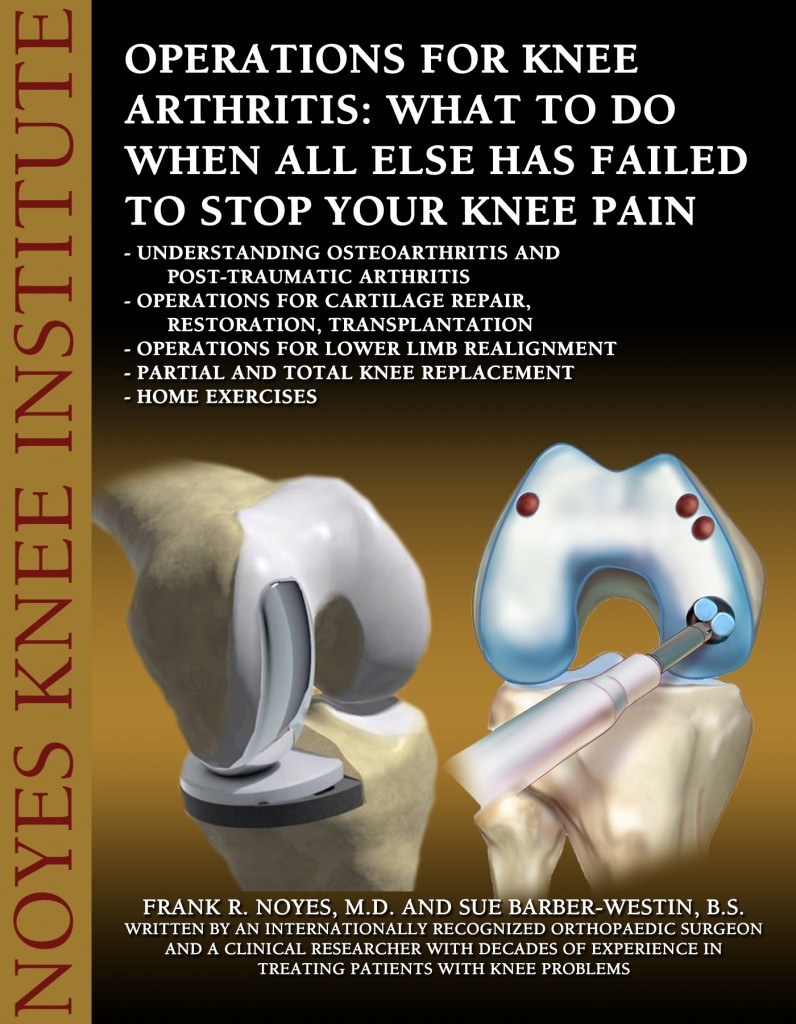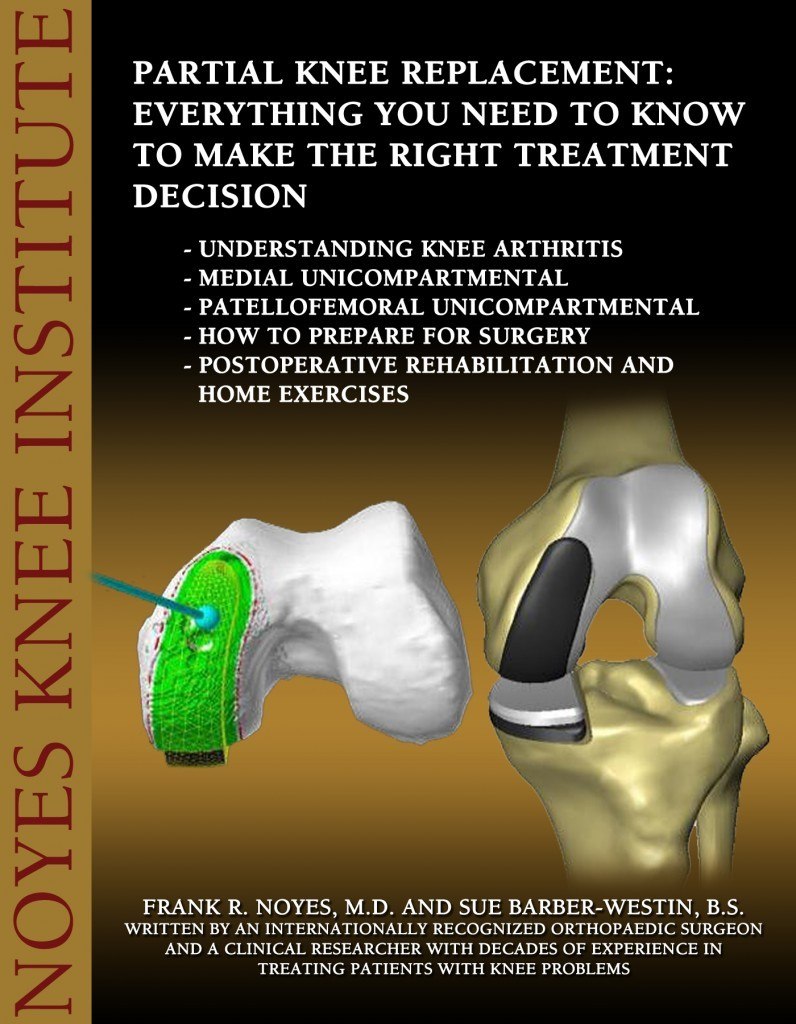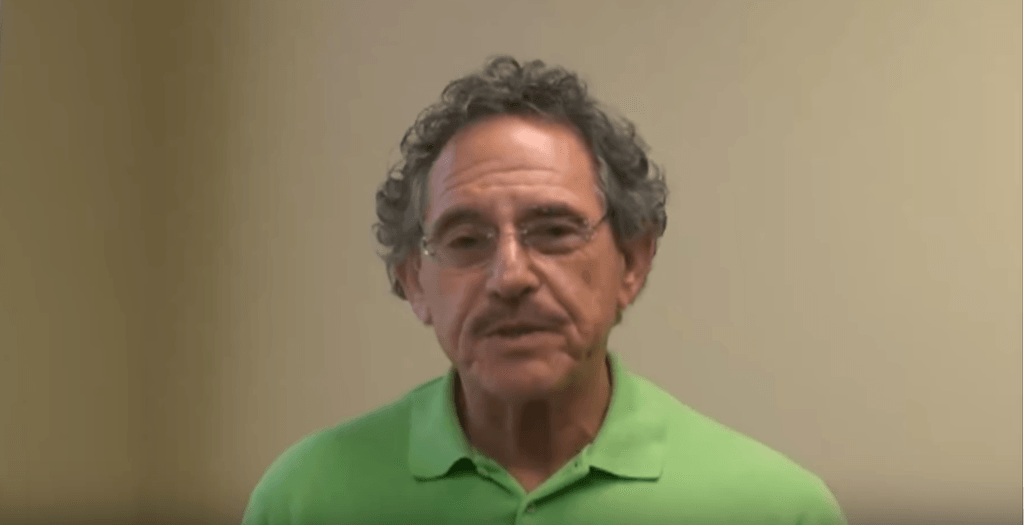Your knees take incredible strain and stress. The weight of much of your body rests on them, and your activity can be severely impaired if you have knee pain or an injury. Knee surgery or a replacement can strengthen your knee and reduce discomfort.
If you experience knee pain when you walk or stand, come to the Noyes Knee Institute to find a solution. Dr. Frank R. Noyes, MD, can examine your knees, prescribe treatment, and perform knee surgery if necessary. We are the premier choice for knee treatment in Cincinnati, OH, Kentucky, Michigan, and surrounding areas.
Dr Noyes recently completed a five year study of our total knee replacements with one of the highest patient satisfaction rates of 96% ever published. The comprehensive study will be published in 2021. The study involved patients that desired to continue with recreational activities and an active life style. The patients had advanced physical therapy programs developed by Dr Noyes and the specialty knee rehabilitation team. Dr Noyes stressed that many patients develop marked muscle weakness with the years of knee pain and disuse before replacement surgery and this requires months of dedicated muscle therapy to regain knee stability and function. The Noyes Knee Institute is nationally and internationally known for the expertise and development of state of the art rehabilitation programs after knee surgery.
The most advanced COMPUTERIZED KNEE SURGERY TECHNIQUES are used for minimally invasive knee surgery using state of the art programs to decreases risks of surgery, bleeding, motion loss, and blood clots. Advanced pre-emptive pain reduction programs that include local nerve blocks are designed to make our patients comfortable. Our compassionate team encourages family members to be a part of the program.
Why Choose NKI for your Knee Replacement
Surgery is a last resort, but when it’s time for knee surgery, you can rest assured that you are in good hands. Do you have knee pain? Call the Noyes Knee Institute at 1.513.794.8471 or schedule an appointment online. We are happy to serve you, whether you are coming from Ohio, Kentucky, Michigan, or around the nation.
Total Knee Replacement Patient Success Story
Frequently Asked Questions
Knee Replacement What you need to know to Return to Activities of Daily Living & Recreational Sports after Knee Replacement
Is the total knee replacement strong enough to allow safe return to recreational activities?
Yes, the engineering design and component materials allow for light recreational sports. Impact sports are not advised such as running, basketball, or other high impact activities although some patients perform at their own risk. The concern is that repetitive impact loading may increase loosening and wearing of the knee components.
Are the ligaments and bone around the knee replacement strong enough to perform recreational activities?
Yes, in general this is not a problem. The surgeon will determine after surgery if the knee joint has good ligament stability and alignment. There is always the small possibility of loosening of the implant at the bone cement junction. This can occur with normal activities of daily living and is not necessarily related to recreational activities. It is important for females to maintain good bone health and obtain a Dexascan and use supplements of calcium and vitamin D. A vitamin D blood testing may be considered. Your PCP should establish a monitoring program for good bone health.
What is the primary problem I may experience with return to recreational activities?
First there must be good muscle strength and function. Many patients put off the knee replacement for years during which time the muscles become weak and have disuse changes. Some of these muscle changes may be permanent. Once you have a new knee joint that is not painful the muscles can start to rebuild and function again in a more normal sense. Many patients have muscle strength deficits that do not allow them to climb stairs or get up from a chair. Muscle weakness of the lower extremity needs to be corrected by intensive physical therapy over many months after surgery.
What type of therapy programs exist to correct muscle weakness after surgery?
The answer is there are many types that need to be tailored to each patient. Let your therapist know if any exercise causes pain or aggravates arthritis in the hip or spine. A comprehensive program also involves home therapy sessions that you conduct on your own following your therapist instructions. The more diligent the patient is in performing the exercises after surgery the better the result in overcoming muscle weakness. The exercises also involve the hip joint, calves and ankles and abdominal core strength and exercises to improve flexibility.
Click here to see our physical therapy program after total knee replacement.
Click here to see our physical therapy program after partial (unicondylar) knee replacement.
How long is the physical therapy program after knee replacement?
The answer is different for each patient. In general, it takes 12 to 16 weeks of therapy both in the office and doing exercises at home to regain knee strength and function to a reasonable level to allow activities of daily living. The patient sees the PT twice a week for 4-6 weeks and then once a week assuming good return of knee motion and strength. It is strongly recommended to join a health club exercise facility to continue muscle strengthening for 12 months after surgery.
Is the return of knee motion a problem that may limit my ability to perform activities of daily living?
The answer is yes, very much so, and the return of functional knee motion is just as important as regaining muscle strength. The two go together. Many patients have a loss of knee extension and flexion before surgery and the muscles have shortened prior to surgery. The surgeon uses special techniques at surgery to regain normal knee motion with the joint implant however this is under anesthesia with the muscles relaxed. After surgery, the muscles return to their shortened state and must undergo a stretching and flexibility program that is very important in the first 6 weeks of surgery.
About 10% of patients will have a major problem in gaining a functional range of knee motion and develop excessive scar tissue about the knee joint that limits knee motion. This requires the patient enter into a special rehabilitation program, with extended therapy visits, use of special appliances, and even a gentle knee manipulation. At our knee enter we have special program as an MD-PT team, with a national reputation for expertise in dealing with these problems. We have published numerous articles and scientific studies in returning patients to all levels of activity and athletic pursuits. Let your MD-PT team know of your goals so we can adjust and tailor the program for you.
Once I have successfully completed the first 12-16 weeks of therapy after surgery are there special therapy instructions to return to recreational activities?
The answer is yes, a more intensive muscle strength program will be required as recreational activities require greater muscle strength to maintain knee function and stability under higher recreational demands. Your PT will measure your muscle strength using a special machine and provide you a written report so you will know exactly where you are weak and the exercises you need to perform. It really takes up to one year to regain good muscle strength and function and every month after surgery you will feel better and stronger. The mistake is to go back to recreational activities too early before the suitable return of muscle function that also includes balance and return of muscle strength to the entire lower limb and hip joint.
How long is the therapy program to return to recreational activities?
The answer is there are different phases depending on the type of activity. For return to golf, generally this is successful at 6 months after surgery using a golf cart. For biking, hiking, and activities such as these, in general, they may be started at six months but specific words of caution are necessary to avoid overdoing activities and preventing knee swelling.
What are the mistakes in returning to recreational activities?
The first mistake is to return too soon where there is still swelling in the knee joint. It takes up to a year or longer for the knee joint lining which controls swelling (synovial lining) to return to normal and to not be irritated and secrete fluid with increased activity. Be careful to limit activities until the knee swelling is under control. This may require anti-inflammatory medications and frequent icing during the day. This can be a real problem in patients whose occupations require them to walk over 4 hours a day. Breaking up the length of time walking, taking frequent breaks to elevate the lower limb, use of ice and a compression wrap are important. If you have a strenuous work environment then return to any recreational sports will be a problem.
Are their limitations with combining a gym exercise program and frequent recreational activities?
Yes, there are only so many hours in a week that your knee joint will allow you to do strenuous activities, whether it is work, a gym work out or doing light sports. This is where a balance of the total activities a patient performs in the first year of knee surgery is necessary and your PT can assist you with these decisions. For patients who have been active their whole life it is important to know that you will not be able immediately resume an active recreational lifestyle.
First comes the mandatory therapy to return to daily living activity. Next comes the extended therapy and exercises to overcome the muscle weakness and deficits that occurred as a result of the knee arthritis. Next comes a healing and recovery stage that is different for every patient. Finally. is the gradual return to recreational activities making sure you are ready for this final stage.
From a positive note if you stay with the program, and seek professional PT support, then approximately two-thirds of patients or more can perform their desired recreational activities after knee replacement. However there remains a small percentage of patients that experience knee swelling or pain that must limit their recreational activities even though they are doing very well and much improved overall with daily living activities. If you have trouble returning to activities we need to know to treat any problems that may be present.
What is a balanced activity program to perform after knee replacement?
The best program for an active patient is the 10-20-30 program; ten minutes flexibility of major joints and spine, 20 minutes strength training both upper and lower extremities, and 30 minutes aerobic training to maintain heart fitness and reduce heart disease that may occur with low activity due to arthritis. An exercise that combines the upper and lower extremities is ideal such as an Ellipse type machine. The lower track can either slide or be a stair stepper. The upper arm push and pull on the levers. Your PT can assist you with this program and provide useful information.
As a final positive note; we believe a patient with a total knee replacement should undergo the same type of comprehensive staged exercises as we use for sports and our athletes. It is required to modify some of the exercises however the concept is to regain muscle strength and function, balance, and rehabilitate other areas of the body. Many patients improve yearly after surgery, so if the initial return to recreational activities is not successful we advise to continue a well-balanced and professionally directed program that will often be successful in the long term.
Nutrition Concerns for Patient Undergoing Partial or Total Knee Replacement
Strong Advice for All My Patients by Frank R. Noyes, MD
ALBUMIN is a very important protein in your bloodstream that is a key factor in your ability to heal after surgery. About one-third of patients do not have completely balanced diets including meats, eggs, vegetables, and vitamins. Before surgery, we will order an albumin test to make sure your levels are adequate and advise if you need added protein supplementation.
I want my patients undergoing major surgery to supplement their normal diet with added proteins and amino acids. There are many good preparations from GNC stores and online. GNC AMP Wheybolic is one product that provides 40G of protein in 2 scoops and is low in carbohydrates that limits calorie intake. There are other forms of protein at your grocery or pharmacy store. Again, select a high protein, low-calorie product. A protein shake with yogurt and blueberries every day is ideal. Do not use if you have kidney disease because the added protein requires good kidney function and hydration. If you are lactose intolerant, try a plant-based product. Start your protein supplements 4 weeks before and continue 8 weeks after surgery.
Yogurt or probiotic products are also recommended for 4 weeks before surgery because you will receive high doses of antibiotics and this helps prevent GI problems after surgery.
Gamma Globulin is also a protein in your bloodstream that is very important to fight infection and prevent infection. It is rare to have low levels; however, you will be tested before surgery to make sure you are protected.
Multivitamins that include good doses of Vitamin D and C and others are important. Most Americans have adequate levels; however, I still recommended a daily multivitamin 8 weeks before and after major surgery.
Vitamin D deficiency is more common in America and most PCPs will test their patients for this at some time. If you are not routinely exposed to sunlight or have a darker complexion, you should be tested because Vitamin D is absorbed through the skin.
Women with any family history of low bone density or bone mass, or over 50 years of age, should have a Dexascan to make sure their bones are healthy and to rule out osteoporosis. This is important because a total knee replacement must be anchored onto good strong bones at the knee joint. Vitamin D and calcium supplementation is important for patients with decreased bone density.
If you are over 50, please have your colon scoped before a knee replacement to avoid this procedure in the early years after surgery. Also, make sure you have no infection in your mouth and that your teeth and gums are in good shape. Any urinary risk factors such as recurrent infection or difficulty voiding require treatment before surgery.
Iron deficiency anemia is important to exclude and you will be tested for your hemoglobin and hematocrit which are measures of your red blood cells. A deficiency may be a reason to cancel surgery because you must have adequate red blood cell levels for surgery and to avoid a blood transfusion.
Diabetics is an added risk factor for surgery and it is highly important that your A1C be normal and not elevated, otherwise, surgery will be canceled.
Excessive body weight is another risk factor for surgery problems and it is important that you achieve a balanced diet and healthy weight. Often, surgery will be postponed to allow time for appropriate weight loss.



